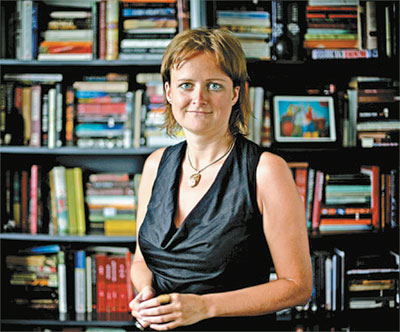
Wang Yuanyuan
cheekywang@hotmail.com
PENGUIN China hopes to introduce Chinese culture to the world through cooperation with more expatriates who are experts in Chinese language and culture.
“We have about 50 expatriates who have long-term cooperation with us and we think that is not enough,” said Jo Lusby, managing director of Penguin China.
In the past, most of the translators were professors in foreign countries, but now more are expatriates living in China who are native English speakers and familiar with Chinese culture.
In Lusby’s opinion, a good translator of Chinese books should be a native English speaker and know Chinese language and Chinese culture very well.
Several years ago, Penguin China organized a workshop for overseas translators in China. “The workshop, which was partly a government relations exercise, went successfully and we hope to have more in the future,” Lusby said.
“We find that many foreigners living in China want to learn more about Chinese culture and they also want to bring some books featuring Chinese culture and stories to their friends and families in their home countries, so we want to publish more books to meet their demands, introducing China to the world through books,” Lusby said.
Translating Chinese literature into English is an extremely high priority for Penguin. “It takes up a lot of our time and it generates quite a lot of revenue,” she said.
Meanwhile, imported books also contribute a lot of the company’s revenue.
“When we first entered the Chinese market in 2005, most of our imported books were bought by foreigners in China, but now about 90 percent of our sales are to Chinese readers. We tried to make English-language publications with Chinese publishing houses, but we found that Chinese readers prefer to read the original version of the English books,” Lusby said.
To attract more readers, Penguin now cooperates with bookstores and reading communities. “For example, we are now working with Page One bookstore in Beijing. It is foreigners’ favorite place and a growing number of Chinese readers like to spend time there,” she said.
Lusby recently gave a speech on the challenges to the publishing industry posed by digital technology. In the speech, she described Penguin’s efforts in developing e-books.
“China is beginning to embrace e-books, but the market is very big,” she said.
At present, Penguin has about 160,000 e-books in overseas market and she plans to introduce the products to China.
“We are planning to launch an application for mobile phones or panel computers. It may charge more than some unauthorized books, but I think more people will gradually accept the idea of paying for these Internet services,” she said.
For example, a parent wants to watch cartoons or other children’s programs with her child. “Of course, you can get these programs one by one from youku.com and watch them for free. But you cannot be sure that your child will not click on inappropriate content when left unsupervised. If you pay for a special application for children’s programs, you will not have these problems and you can access these programs more easily. It is a very good protection system and the question is how much you would like to pay for such an application. This is what we are exploring,” she said.
Penguin, like many other publishing houses seeking further development in e-books, is now testing the market on price issues. “We have to find a proper price for our books. It should be acceptable for readers but will not be cheap as we have to make money. This will be our main task for a long time,” she said.
|

